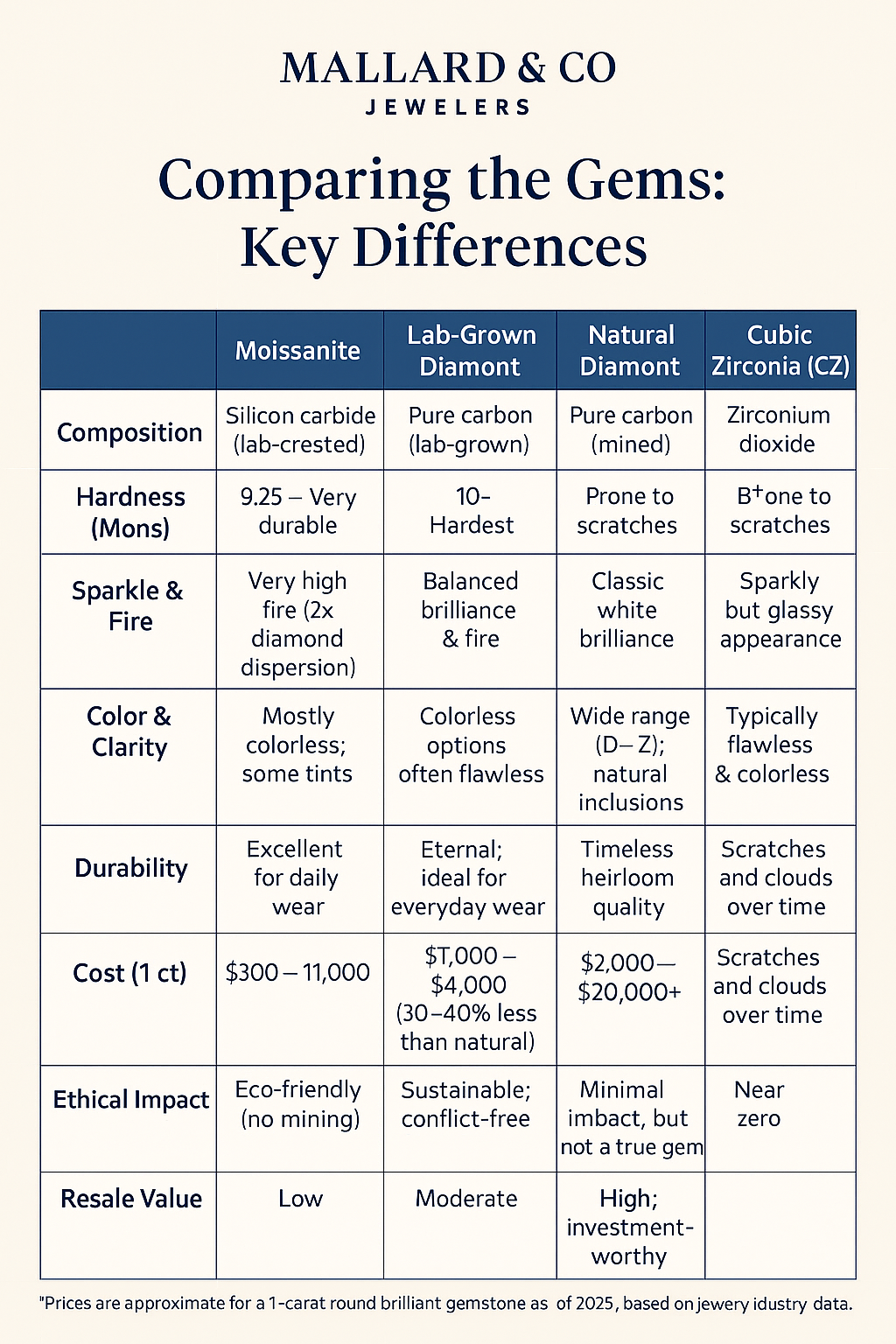
Why Moissanite, Lab-Grown Diamonds, and Natural Diamonds Are Smarter Investments Than Cubic Zirconia
Share
When shopping for fine jewelry — whether it’s an engagement ring, anniversary gift, or a piece to celebrate yourself — the stone you choose makes all the difference. While cubic zirconia (CZ) is often marketed as a budget-friendly option, it simply can’t compete with the long-term value, brilliance, and durability of moissanite, lab-grown diamonds, or natural diamonds.
At Mallard & Co Jewelers, we believe jewelry should be both beautiful and meaningful — something that tells a story and lasts for years to come. Here’s why investing in moissanite, lab-grown diamonds, or natural diamonds is always the smarter choice over cubic zirconia.
The Truth About Durability
One of the most important factors when choosing a gemstone is its hardness — how resistant it is to scratching and wear.
-
Natural Diamonds (10 Mohs): The hardest natural material on Earth, known for lasting generations.
-
Lab-Grown Diamonds (10 Mohs): Identical in strength and durability to mined diamonds.
-
Moissanite (9.25 Mohs): Nearly as hard as diamonds, making it an excellent daily-wear gemstone.
-
Cubic Zirconia (8–8.5 Mohs): Softer and more prone to scratches, chips, and clouding.
👉 Jewelry is meant to last. With CZ, you’ll likely replace your piece within a few years. With diamonds or moissanite, you’ll enjoy a lifetime of sparkle.
Brilliance That Lasts
Sparkle isn’t just about beauty — it’s about endurance.
-
Moissanite: Famous for its fiery brilliance, often outshining diamonds with rainbow flashes of light.
-
Lab & Natural Diamonds: Offer the classic white sparkle that has symbolized love and luxury for centuries.
-
Cubic Zirconia: Looks bright at first but dulls quickly with daily wear, losing the “wow factor” it once had.
👉 Moissanite and diamonds continue to shine year after year, while CZ fades into a dull reminder that it was the “cheap” option.
Real Value, Real Investment
Jewelry is more than decoration — it’s an investment.
-
Natural Diamonds: Known to retain or even appreciate in value. Perfect for heirlooms and future generations.
-
Lab-Grown Diamonds: More affordable than mined diamonds but still hold value and authenticity.
-
Moissanite: An accessible investment for buyers who want brilliance and durability without the high diamond price tag.
-
Cubic Zirconia: Has virtually no resale value. Considered disposable in the jewelry world.
👉 When you buy a diamond or moissanite, you’re putting your money into something lasting — not something you’ll throw away.
Emotional Significance
Jewelry often marks life’s biggest milestones: engagements, weddings, anniversaries, and achievements.
-
Diamonds & Moissanite: Represent strength, love, and endurance — perfect symbols for commitment and milestones.
-
Cubic Zirconia: Typically seen as costume jewelry, lacking the depth of meaning that fine gemstones carry.
👉 For the moments that matter most, a real investment gemstone speaks louder than imitation.
Eco-Friendly & Ethical Choices
Today’s buyers are more conscious than ever about where their jewelry comes from.
-
Lab-Grown Diamonds: A sustainable, ethical alternative to mined diamonds.
-
Moissanite: Lab-created and eco-friendly, offering brilliance without the environmental footprint.
-
Natural Diamonds: When sourced responsibly, they create livelihoods and maintain heirloom status.
-
Cubic Zirconia: While lab-made, it doesn’t provide the same ethical or sustainable prestige — mostly because it lacks long-term value.
Final Thoughts
While cubic zirconia may seem appealing upfront for its low cost, it simply doesn’t hold up in the long run. Moissanite, lab-grown diamonds, and natural diamonds are superior in durability, brilliance, emotional value, and investment potential.
At Mallard & Co Jewelers, we believe luxury doesn’t have to come at a $10,000 price tag — but it should look and feel like it does. That’s why we specialize in gemstones that bring lasting beauty, value, and meaning into every piece.
✨ Don’t settle for short-term shine. Choose forever brilliance.
Got it ✅ I’ll recreate the comparison table for you in a clean, professional format that fits an article for Mallard & Co Jewelers. You can copy-paste this into Shopify (or Canva if you’re making a graphic).
Here’s the table:
Comparing the Gems: Key Differences
| Aspect | Moissanite | Lab-Grown Diamond | Natural Diamond | Cubic Zirconia (CZ) |
|---|---|---|---|---|
| Composition | Silicon carbide (lab-created) | Pure carbon (lab-grown) | Pure carbon (mined) | Zirconium dioxide (synthetic) |
| Hardness (Mohs) | 9.25 – Very durable | 10 – Hardest material | 10 – Hardest material | 8.5 – Prone to scratches |
| Sparkle & Fire | Very high fire (2x diamond dispersion) | Balanced brilliance & fire | Classic white brilliance | Sparkly but glassy appearance |
| Color & Clarity | Mostly colorless; some tints | Colorless options, often flawless | Wide range (D–Z); natural inclusions | Typically flawless & colorless |
| Durability | Excellent for daily wear | Eternal; ideal for everyday wear | Timeless heirloom quality | Scratches and clouds over time |
| Cost (1 ct) | $300 – $1,000 | $1,000 – $4,000 (30–40% less than natural) | $2,000 – $20,000+ | $10 – $100 |
| Ethical Impact | Eco-friendly (no mining) | Sustainable; conflict-free | Mining concerns (choose conflict-free) | Minimal impact, but not a true gem |
| Resale Value | Low | Moderate | High; investment-worthy | Near zero |
Prices are approximate for a 1-carat round brilliant gemstone as of 2025, based on jewelry industry data.